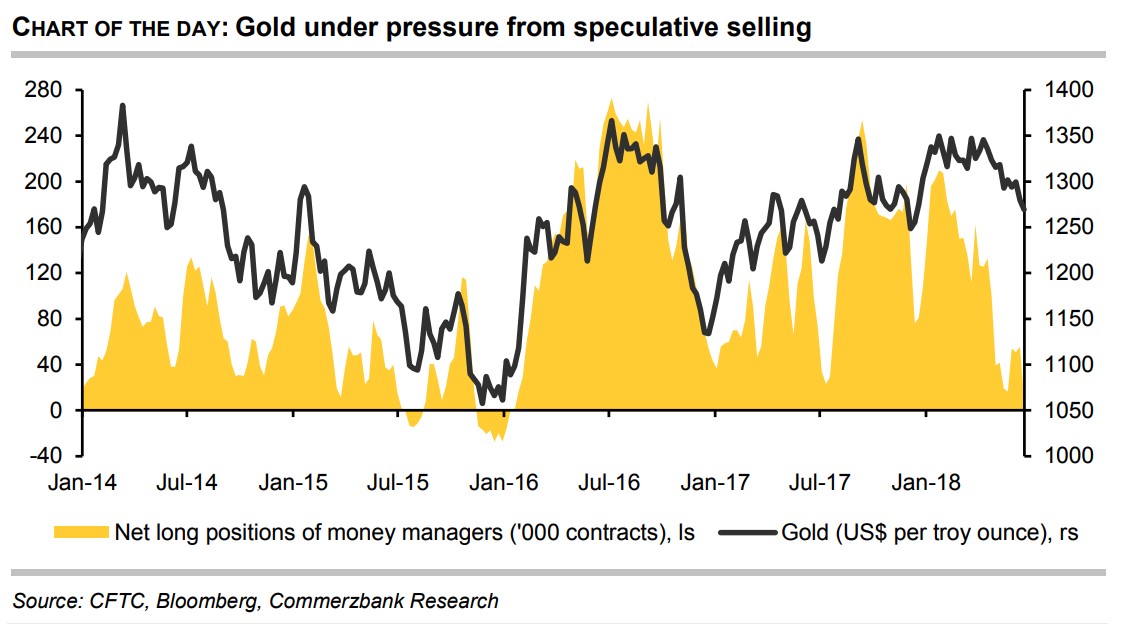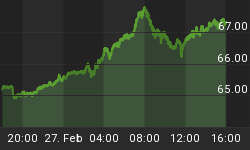Monday, June 25, 2018
Stocks fall on trade concerns. U.S. and European stocks fell back in early trading on Monday on fears of a deepening trade conflict. Also, Italian bonds dropped after the nationalist and Euro-skeptic Lega party won municipal elections. Turkey’s President Recep Tayyip Erdogan won 53 percent of the vote in a presidential election, consolidating his power. Erdogan’s strengthening grip is widely viewed as a deterioration of the country’s democratic institutions.

(Click to enlarge)
- Hedge funds and other money managers cut their net long positions to just 10,500 contracts for the week ending on June 19, the lowest level in two and a half years. That has led to a selloff in gold this month.
- “We still see no justification for gold’s weakness, however,” Commerzbank wrote in a note.
- The bank cited political turmoil in the EU, economic risk in Turkey, and the U.S.-EU trade war, among other factors, which should all “really benefit gold as a safe haven,” Commerzbank said.
Markets
Yuan losing ground, posing conundrum for Beijing. China’s yuan has given up all of its gains against the dollar this year, and is now down about 0.2 percent relative to the greenback. Because China’s economy is cooling, Beijing wants to provide a bit of monetary stimulus. The People’s Bank of China said Sunday moved to inject more than $100 billion into the economy by cutting the required reserves that banks have to hold. However, that will put more downward pressure on the yuan, which could increase capital outflows from the country. Related: ICO Startups Now Buying Real World Companies
Trump threatens 20 percent tariff on European cars. President Trump threatened to slap a 20 percent tariff on imported automobiles from the European Union, which would dramatically escalate the trade war. Shares of European automakers declined on the news late last week, including those of Volkswagen (OTCPK:VLKAY), Daimler (OTCPK:DDAIF), BMW (OTCPK:BMWYY), Renault (OTC:RNSDF, OTCPK:RNLSY), Fiat Chrysler Automobiles (NYSE:FCAU) and PSA Group (OTC:PUGOF, OTCPK:PUGOY). “If they decide to raise their import tariffs, we’ll have no choice, again, but to react,” EU Commission Vice President Jyrki Katainen told French newspaper Le Monde.
U.S. to bar Chinese investment in tech. The Trump administration is set to roll out new restrictions on Chinese investment in U.S. technology companies, while also barring additional technology exports to China. The rules would block companies with 25 percent Chinese ownership from buying stakes in U.S. companies with “industrially significant technology.” The aim is to prevent China from gaining a strategic edge over the U.S. “We’ve got trillions of dollars seeking our crown jewels of technology,” said White House trade adviser Peter Navarro last week. “There has to be a defense against that.” The two measures could be unveiled by the end of the week.
Commodities
Commodity hedge funds see closures. In 2017 the number of hedge funds focused on commodities closed at a faster pace than those starting up, the first time that has occurred since data collection began in 2000, according to Eurekahedge. Funds were burned by the commodity downturn that began in 2014, and the volume of new hedge funds launching operations has not rebounded even as commodity prices are rising again. “The number of commodity funds reporting returns has fallen to an all-time low of 130 this year, compared with a peak of 371 funds in 2011,” the Wall Street Journal wrote. Trading commodities has increasingly been dominated by algorithms, making big, bold bets harder to pull off compared to the past.
Gold under pressure from speculative selling. Gold prices fell sharply in mid-June and continued their downward trajectory as hedge funds and other money managers sell off positions. Net-length in gold contracts has declined to their lowest level in more than two years. Gold has fallen below the technical 100-day moving average and is flirting with the 200-day moving average.
Commodity prices face downside risk. “Commodity performance has remained lackluster, and with the notable upside risk from oil supply disruptions, we think the risks are skewed to the downside for the rest of the year,” Barclays wrote in a note last week. The investment bank pointed to a series of risks, including deleveraging in China, weaker global economic growth, protectionism and a stronger dollar as just some of the formidable headwinds facing commodity prices.
Energy
OPEC+ agree to production increase. OPEC and its coalition partners led by Russia will increase production beginning as soon as July. The OPEC+ group lifted country-specific targets but maintained the collective target, which, in effect, will lead to a nominal increase of 1 million barrels per day. In reality, not all countries have the ability to boost output, so the actual increases could be in the range of 600,000-700,000 bpd. Oil prices shot up more than 5 percent on Friday as the market viewed the agreement as less aggressive than expected. "The lack of specificity is bullish for prices,” Joe McMonigle, senior energy analyst at Hedgeye Risk Management LLC., told Bloomberg “It’s a mystery oil production increase because we don’t really know the final numbers."
OPEC+ working on 2019 deal. Russia’s energy minister Alexander Novak told CNBC that the OPEC+ groups is already working on an oil production deal for 2019. “We are planning to sign a new agreement by the end of this year,” Alexander Novak said at the OPEC summit in Vienna. The terms of the current deal expire at the end of 2018, but the group will likely want to keep some sort of market management deal in place beyond this year. Meanwhile, Russia and Saudi Arabia have been in talks about a more permanent bilateral cooperative framework.
Related: U.S. Money Market Funds Post Highest Outflows Since 2011
Saudi Arabia says it has 2 mb/d of spare capacity. The flip side of OPEC+ increasing output is the winding down of spare capacity, which has raised worries about how the market would respond to interruptions. Saudi Aramco said on Monday that it has 2 million barrels per day of spare capacity, a statement meant to tamp down fears of a potential supply crunch. Aramco’s CEO said that the company can produce 12 mb/d, compared to current output levels at 10 mb/d, although it should be noted that the company has yet to prove that it can produce at those levels.
Cryptocurrencies
Bitcoin plummets after Japan regulatory action. Last week, Bitcoin fell to its lowest price since November 2017 after Japanese regulators sent six of the country’s top cryptocurrency exchanges business improvement orders. Japan’s Financial Services Agency will require the trading exchanges to submit anti-money laundering plans by July 23. Bitcoin fell 10 percent on the news, dipping close to $6,000. The MVIS CryptoCompare Digital Assets 10 Index also fell roughly 10 percent.
CCID ranks blockchain, and Bitcoin doesn’t crack top 10. China Electronic Information Industry Development (CCID) issued rankings for blockchain, and it chose EOS as the number one blockchain network in the world by technology and innovation. Ethereum came in second place and Bitcoin did not even rank in the top 10.
South Korea refutes rumors of 10 percent tax on cryptocurrencies. On June 22, domestic media outlet Chosun reported that a “high-ranking government official” claimed that the South Korean government was preparing a 10 percent tax on profits from cryptocurrencies. “We have already decided to tax profits from investments in cryptocurrency,” the government official was quoted as stating. “The question is only how much time we should give investors and when to start implementing it.” However, the government came out and denied such claims.
By Josh Owens for Safehaven.com
More Top Reads From Safehaven.com:
















